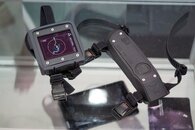You are using an out of date browser. It may not display this or other websites correctly.
You should upgrade or use an alternative browser.
You should upgrade or use an alternative browser.
Underwater GPS
- Thread starter tridacna
- Start date
Please register or login
Welcome to ScubaBoard, the world's largest scuba diving community. Registration is not required to read the forums, but we encourage you to join. Joining has its benefits and enables you to participate in the discussions.
Benefits of registering include
- Ability to post and comment on topics and discussions.
- A Free photo gallery to share your dive photos with the world.
- You can make this box go away
much higher than that"In the range of a high end DC."
Okay, nothing new here. Can the startling title of this thread be changed to something less misleading? As the first however-many comments noted, there is no "underwater GPS."
rmssetc
Contributor
Okay, nothing new here. Can the startling title of this thread be changed to something less misleading? As the first however-many comments noted, there is no "underwater GPS."
The title is only misleading if you expect that Global Positioning System refers specifically to a receiver for picking up satellite signals from NAVSTAR, GLONASS, etc.
Certainly the title is meant to draw readers to the thread, but I'd say it's perfectly valid to use other technologies (dead reckoning, map+compass+clock+sextant, etc) in order to determine one's position on the globe.
The questions of how well this positioning system actually works, whether it is truly novel, and the expense are still open...
The title is only misleading if you expect that Global Positioning System refers specifically to a receiver for picking up satellite signals from NAVSTAR, GLONASS, etc.
Certainly the title is meant to draw readers to the thread, but I'd say it's perfectly valid to use other technologies (dead reckoning, map+compass+clock+sextant, etc) in order to determine one's position on the globe.
THE Global Positioning System is what it is. Yes, I would expect a reference to GPS to refer to GPS. "Other technologies," such as inertial navigation, are not the Global Positioning System.
I realize that the two minutes I feel I wasted reading after clicking on the thread title will not ruin my life, but for whatever it's worth, I would not have clicked on the link had I understood the thread to be about an inertial navigation system, which has been the subject of many prior discussions.
Well you spent way more than two minutes complaining about the two minutes you wasted, but then again that's typical forum behavior, nothing new there.THE Global Positioning System is what it is. Yes, I would expect a reference to GPS to refer to GPS. "Other technologies," such as inertial navigation, are not the Global Positioning System.
I realize that the two minutes I feel I wasted reading after clicking on the thread title will not ruin my life, but for whatever it's worth, I would not have clicked on the link had I understood the thread to be about an inertial navigation system, which has been the subject of many prior discussions.
Yopu get
you get more with honey than vinegar
Well you spent way more than two minutes complaining about the two minutes you wasted, but then again that's typical forum behavior, nothing new there.
you get more with honey than vinegar
archer1960
Contributor
That's one of the problems - in order to be accurate, you have to be very still when you start tracking - any drift will accumulate over time and the error will accumulate. For example, if you start drifting 20 feet per minute, you'll be off by 200 feet after 10 minutes, etc.. If you start still and accelerate to drifting 20 feet per minute then drift for 10 minutes, it should know you are 200 feet away from where you started.
You also need pretty good sensors, but the math isn't all that complex. That said, you have to track orientation of the device as well as movement of the device, and every measurement's inaccuracy accumulates over time with all the other errors. I wouldn't expect pinpoint accuracy out of a consumer product, but probably good enough for scuba diving.
Yup. There's nothing magical or particularly complex about inertial navigation, it's just challenging engineering to do it in a relatively small package at a price that divers will pay. If you stay at the surface for 30 sec or so for the gps to pick up your drift, before shifting to inertial mode under the water, that should be enough to get it initialized properly. That is, assuming they design the software well...
K
KeithG
Guest
the part i do not understand is: if you are gently drifting with the current, then none of the sensors will sense any force (except maybe the compass thingy or the depth thingy) so how does it know you are (or are not moving)?
And what happens when the current changes direction?
Many of the examples of "navigation systems" in this thread are hybrid systems that rely on multiple different sensor systems. For instance: in my world GPS sucks and wifi rules since I am mostly either underground or trapped between concrete towers and GPS signals are not reliable.
this thread reminded me of the concept of SLAM: Simultaneous localization and mapping - Wikipedia but they do not seem to understand that SLAM techniques may be required...
And what happens when the current changes direction?
Many of the examples of "navigation systems" in this thread are hybrid systems that rely on multiple different sensor systems. For instance: in my world GPS sucks and wifi rules since I am mostly either underground or trapped between concrete towers and GPS signals are not reliable.
this thread reminded me of the concept of SLAM: Simultaneous localization and mapping - Wikipedia but they do not seem to understand that SLAM techniques may be required...
Giffenk, it knows because you were (hopefully) stationary at one point at the beginning, when you were trackable at the surface or still on the boat. To start drifting, you have to accelerate from your stationary position, which is detectable. This is what we were talking about above - you need to be pretty sure you have a good stationary reference to start if you don't want drift error to accumulate for the hour or so you are diving.
Similar threads
- Replies
- 0
- Views
- 76
- Replies
- 2
- Views
- 498
- Replies
- 60
- Views
- 2,619
- Replies
- 21
- Views
- 1,343
- Replies
- 113
- Views
- 15,645





